Taking control of exposure for creative effects is one the pure joys of photography. Neutral density filters are one tool you can use to control exposure in their ability to reduce the amount of light that enters the lens.
We’ve explained what neutral densities filters are and how to use them, but sometimes you want a more compact, all-in-one solution that lets you explore the effects of an ND filter at a range of different densities. This is when you might want to consider buying a variable ND filter.
What is a variable ND filter?
A variable ND filter is a neutral density filter that allows you to adjust the density of the filter. Typically you twist a ring on the outside of the filter, and the filter shifts between low and high densities (often anywhere from 2 up to 10 stops of light).
When to use a variable ND filter
It’s best to use an ND filter or variable ND filter when you are shooting in strong daylight or other bright conditions and want to shoot with a wide aperture, for instance, to create a shallow depth of field effect. Without an ND filter in this situation you will probably blow out your exposure. An ND filter helps reduce the light coming into your lens, allowing you to shoot at f/2.8, for example, at a reasonable shutter speed.
You might also use an ND filter if you were shooting the sea, for instance, and wanted a daytime long exposure to smooth out the water for that classic milky sea effect. In the daylight you won’t be able to get an exposure long enough to flatten the waves. An ND filter, again, reduces the light hitting your sensor allowing you to shoot at a longer exposure.
When to use a variable ND filter in particular? Variable ND filters are useful because you have control over its opacity. Using our beach example again, if you are photographing a sunset, the light levels will change dramatically over a short period of time. A variable ND filter allows you to keep adjusting the opacity until you no longer need it.
Variable ND filters are also useful for videographers. Say you were filming someone speaking on a street corner and then panned over to a commotion taking place in a dark alley. A variable ND filter lets you seamlessly move your camera from brighter to darker scenes while maintaining the same depth of field in your shot.
Do ND filters affect image quality?
This is a common question, and the answer is no: ND filters will not affect image quality. ND filters only limit the amount of light reaching your camera’s sensor via the lens. You do this in order to get a longer shutter speed. Provided your camera is stable, it will produce sharp, detailed images with an ND filter mounted.
Some of the questions around image quality with ND filters might come down to confusion with colour filters and gels, which can affect your image quality.
How to know when you’ve pushed a variable ND too far
While variable ND filters offer tons of flexibility, sometimes you can push them too far. You’ll know when you’ve done this if you see a funny dark cross in the centre of your scene if you try to darken the image too much – this is a feature of using two sheets of polarising material. And if you use them with a very wide lens there can be variation in the effect across the frame.
What’s more, if you pan in video, the effect may change because polarising filters work best when the sun is to the side of the frame.
Variable ND vs fixed ND filter – what are the differences in image quality?
There are, however, some subtle differences in image quality between variable ND filters and traditional fixed ND filters.
Stills shooters looking for big-resolution, high-quality images (think landscape photographers) will typically opt for a fixed ND filter. Videographers or photojournalists and street and travel photographers might opt for a variable ND filter.
In most instances, a variable ND filter will deliver the image quality you want. But in a few conditions it can struggle.
With reflective surfaces, for instance, a variable ND filter may produce odd tones as you change the strength.
There’s also the issue that with a variable ND filter you are shooting through more layers of glass than you are with a fixed ND filter. This means you can sometimes get softer images.
Then again, with a variable ND filter you might find that you get shots you wouldn’t ordinarily be able to achieve because you don’t have a full set of filter or the time to keep changing them one-by-one.
In short, a fixed ND filter will deliver higher quality images, while a variable ND filter offers far more speed, flexibility and convenience. A variable ND filter will also save you a lot more money in the long run than buying lots of fixed ND filters at different strengths.
Is a variable ND filter a polarizer?
In a word, no. We get this question a lot, and it’s a common misconception, but a variable ND filter is very different from a polarizer filter.
As its name suggests, a polarizer filter removes the polarizing light from a scene, such as glare and reflections. And by doing this you’ll get stronger, more saturated colours. The most common result is a deeper blue sky.
A variable neutral density filter, as we’ve alluded to elsewhere in this guide to the best variable ND filters, controls ALL of the light that enters your camera. Unlike a fixed ND filter that reduces light levels by a stop, a variable ND filter allows you more control over these light levels that you want to block from your sensor.
What is the best variable ND filter?
Variable ND filters come in a range of sizes and price points. To help you choose, we’ve rounded up seven of the best variable ND filters for your needs, from the high end to the budget options.
K&F Concept True Color Variable ND2-32 (1-5 Stops) ND Lens Filter
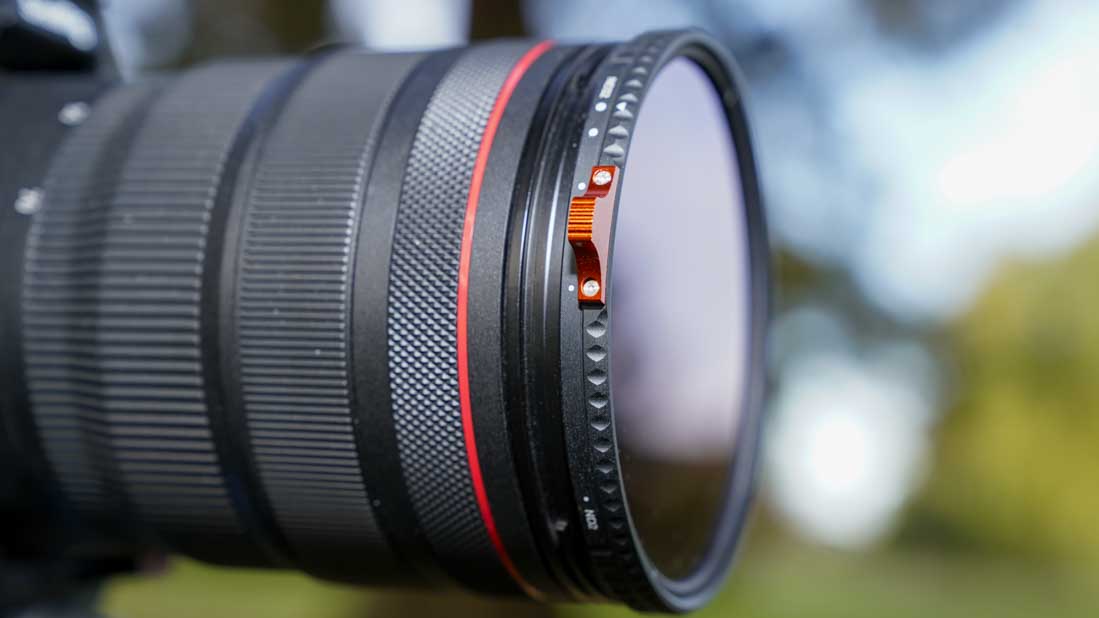
- Price: £89/$119
- Sizes: 49-82mm
- Multi-Resistant Coating
The K&F Concept True Color Variable ND2-32 (1-5 Stops) filter stands out with solid build quality and performance at a midrange price. Offering sharp images and natural colour fidelity with a touch of added contrast, it’s a fantastic choice for photographers and videographers needing a reliable VND.
The build is impressive: a CNC trapezoidal grip, red thumb adjuster, intensity markers, and firm rotation stops all make this filter both practical and stylish.
For the price, it’s well balanced, though minor compromises like slight friction noise and a somewhat style-over-function storage bag are present. Yet, it remains among the best quality VNDs in its price range.
B+W XS-Pro Digital ND Vario MRC Nano
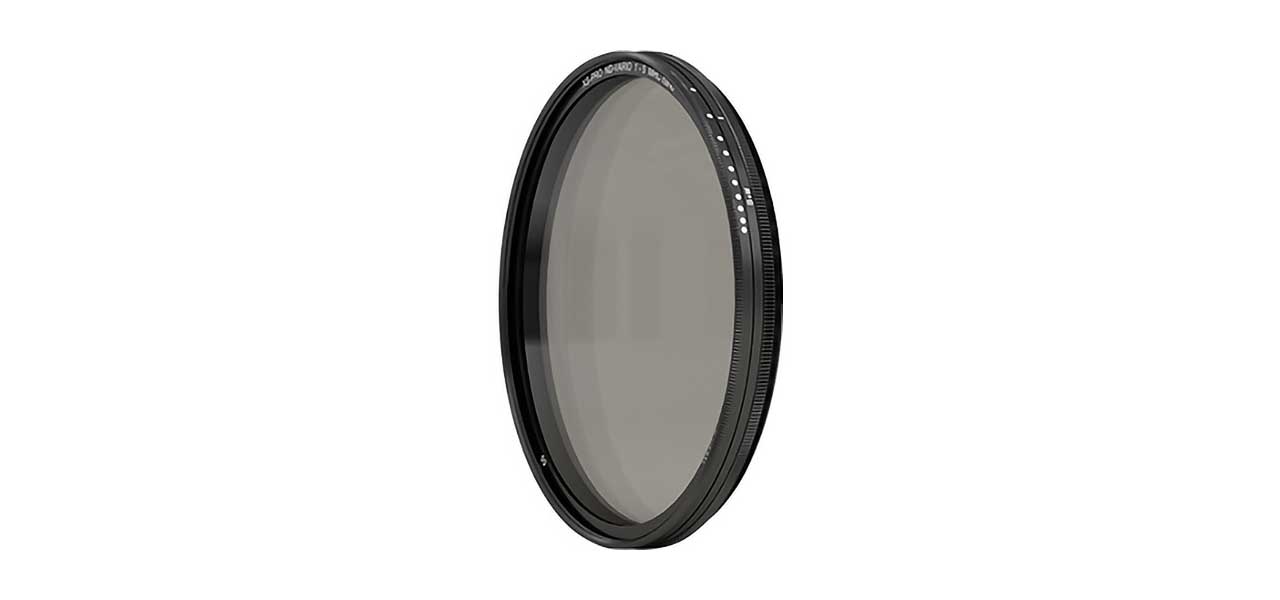
- Price: £224/$189
- Sizes: 52-82mm
- Multi-Resistant Coating
Schneider Optics’ B+W XS-Pro Digital ND Vario MRC Nano is more than you’ve likely budgeted for a variable ND filter, but it’s the variable ND filter you should buy. What sets the B+W XS-Pro Digital ND Vario MRC Nano apart from others is a Multi-Resistant Coating that perfectly repels water. Rain or sea spray, droplets bead up nicely and roll off the filter. What’s more, this coating also effectively reduces ghosting and reflections.
The B+W XS-Pro Digital ND Vario MRC Nano is a screw-in filter, which is 9mm deep (not including the thread), and provides between 1 and 5 stops of light reduction on your scenes.
In use, you’ll find the front ring rotates and is marked with hard stops to indicate where the different densities are located between the minimum and maximum.
Get the best deals on the B+W XS-Pro Digital ND Vario MRC Nano at Amazon UK and Amazon US.
Syrp Variable ND Filter
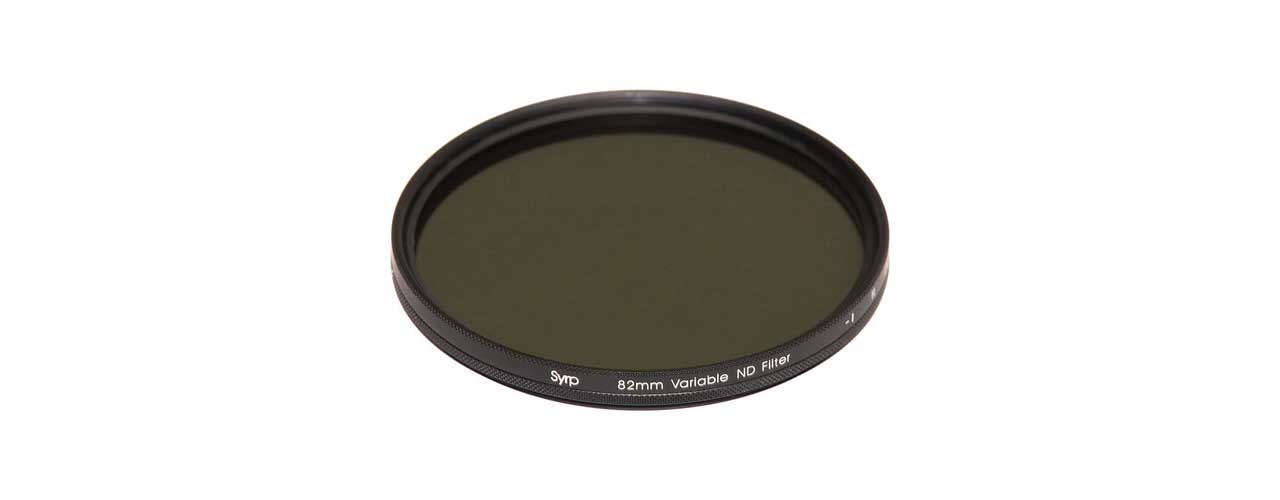
- Price: £139/$139
- Sizes: 52 & 82mm
- Adapter rings
The Syrp Variable ND Filter is also no budget option at £139/$139, but again, it oozes quality and its performance is superb. Interestingly, unlike other filters where you’ll find a range of sizes, Syrp provides two versions: 67mm and 82mm.
The 67mm Small Kit comes with adapter rings that allow you to mount the filter to lenses ranging from 52mm to 58mm. The 82mm Large Kit option provides adapters for lenses from 72mm to 77mm.
So the Syrp offers a lot of flexibility. It also provides near flawless quality in both build and performance. And like the B+W, front coating on the filter makes it water and dust resistant.
Get the best deals on Syrp Variable ND Filters at Amazon UK and Amazon US.
Marumi DHG Vari ND2-ND400
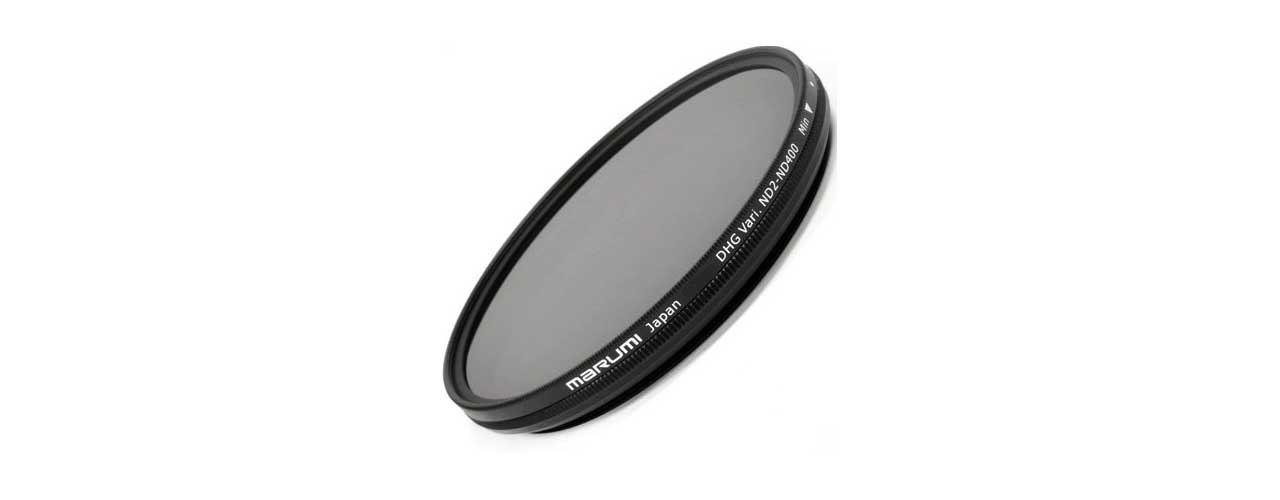
- Price: £55/$93
- Sizes: 52-82mm
- Weather resistant
Distributed in the UK by Kenro, the Marumi DHG Vari ND2-ND400 offers between 1 and 8 stops of light reduction. While not as expensive as the Syrp and B+W, the Marumi still manages to offer solid build quality.
It’s also very quick and easy to mount to your lens. A textured area on the ridge lets you grip it firmly and rotate with ease.
There are no hard stops like the Syrp and B+W, and nor does it offer the coatings. But as a mid-range option, the Marumi is probably your best bet.
Get the best deals on the Marumi DHG Vari ND2-ND400 at Amazon UK and Amazon US.
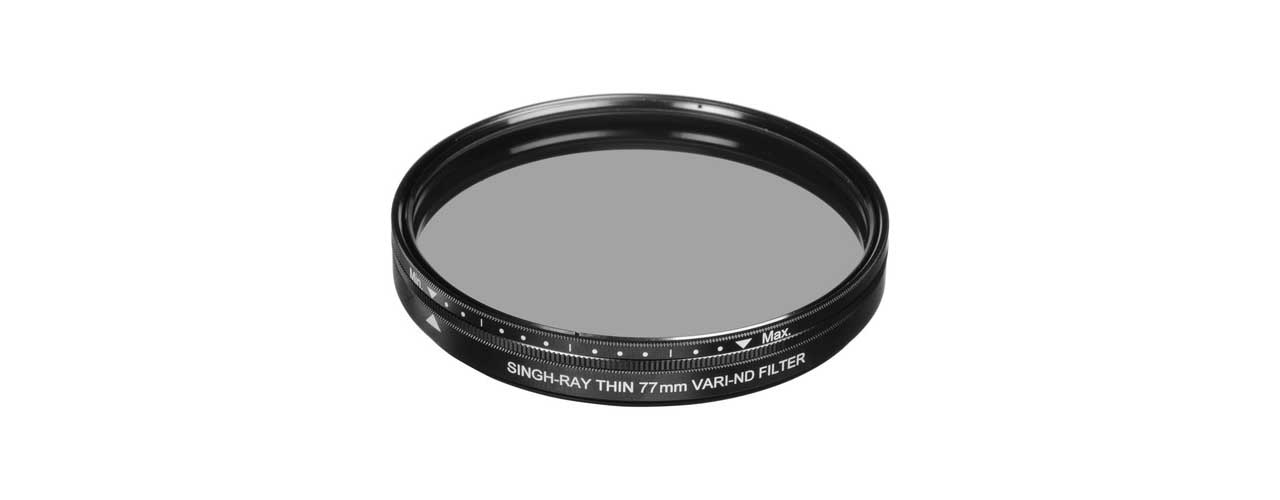
Singh-Ray Variable ND Filter

- Price: £/$390
- Sizes: 49-82mm
- Controls up to 8 stops of light
Singh-Ray’s Variable ND filters come in both standard and thin ring options and let you add between two and eight stops of neutral density to your images.
This variable ND will cost you plenty, but its durability and consistent colours all throughout its different density settings will give your images a reliable style and feel.
At this price, if you’re a hobbyist photographer the Singh-Ray might not be for you. But if you’re a professional or advanced enthusiast looking build a consistent body of work, the Singh-Ray Variable ND Filter is just what you need.
Get the best deals on the Singh-Ray Variable ND Filter at Amazon UK and Amazon US.
Hama Vario ND2-400
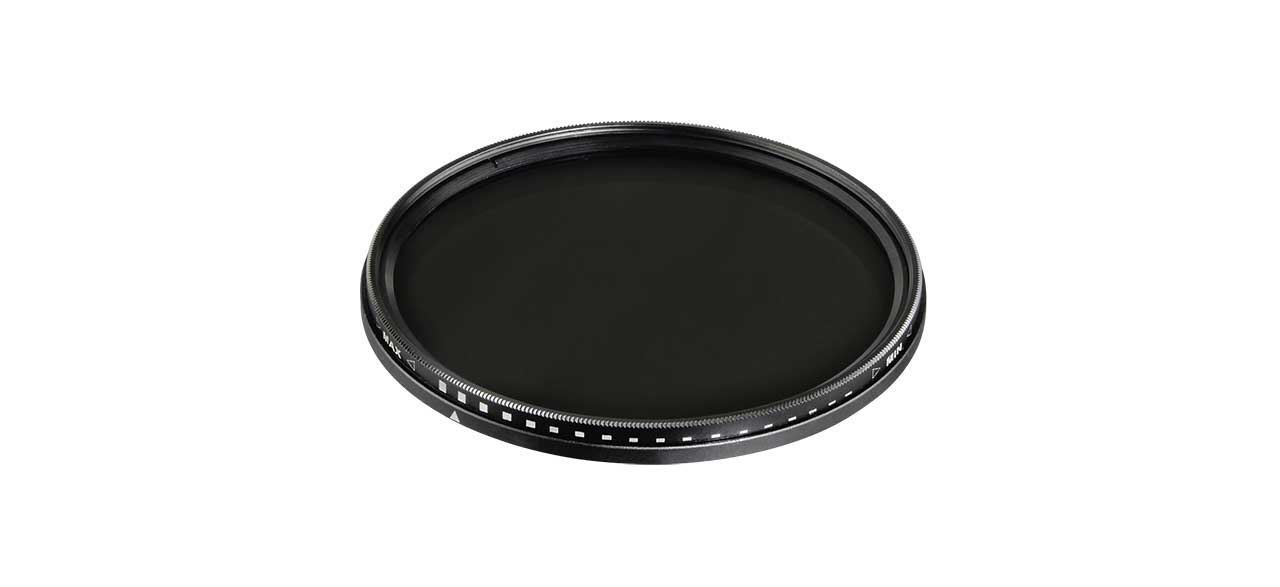
- Price: From £33
- Sizes: 52-77mm
- User-friendly
Hama’s budget offering is a variable ND filter that really punches above its weight. It might not have the same build quality as the Singh-Ray above, but if you’re a hobbyist or just taking your first steps into using ND filters, the Hama Vario ND2-400 is the perfect variable ND for your needs.
Colours and sharpness remain respectably consistent throughout the densities, and beginners will also like how easy this filter is to fit and remove from their lenses.
You won’t find hard stops on the Hama Vario like you do the more expensive ones (there are markings on the ring, however) and there’s no 82mm diameter option. But for price, user friendliness and consistency, this is one of the best variable ND filters out there.
Get the best deals on the Hama Vario ND2-400 on Amazon UK and Amazon US.
Tiffen variable ND filter
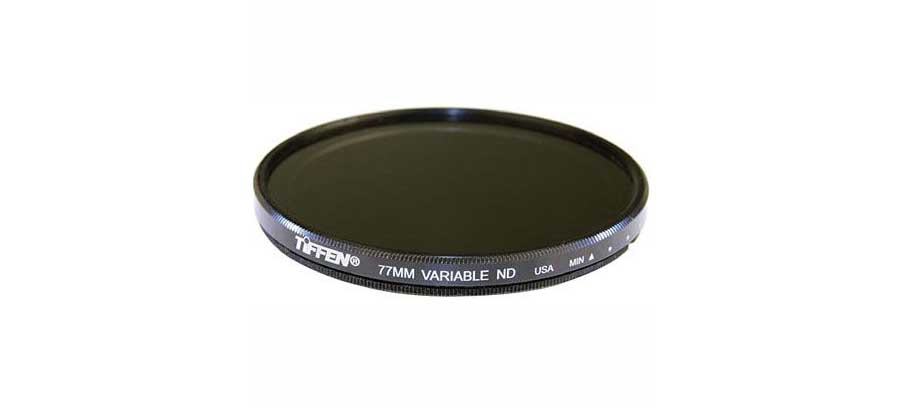
- Price: £95
- 2 to 8 stops of light
- Thin profile ring
Tiffen’s variable ND filter provides 2 to 8 stops of light and is one of the most versatile and easy-to-use options you can buy. It’s also designed with a wider outer optic that helps reduce vignetting when you’re shooting at wide angles.
Excellent value for money, the Tiffen variable ND filter is well made and will bring the colour and clarity back to your outdoor videos and images.
Get the best deals on the Tiffen variable ND filter at Amazon UK and Amazon US.
NiSi Variable ND Filter
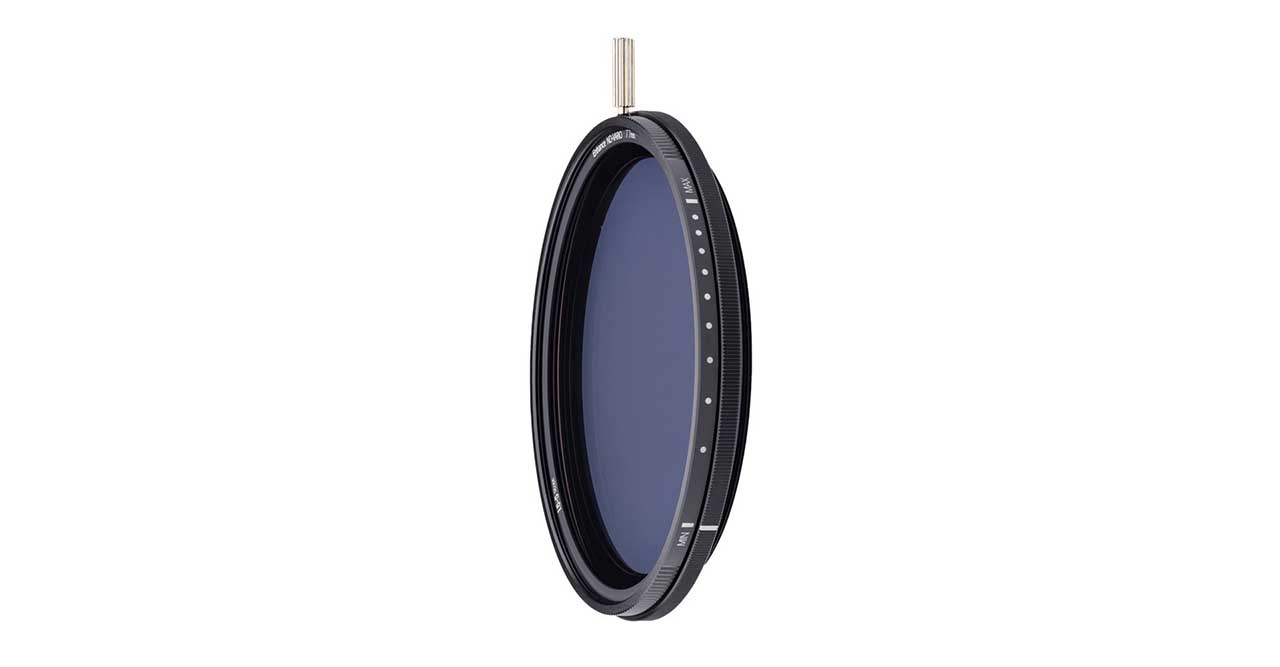
- Price: £109
- 1.5-5 stops
- No colour-cast multi-layer coating
NiSi’s high-end variable ND filter offers a shutter speed reduction of 1.5 to 5 stops. You can control the density via a simple screw on the filter ring, which smoothly cycles through light to dark.
NiSi also promises no loss of sharpness thanks to its contrast colour design and a multi-layer coating that reduces unwanted colour casts.
NiSi’s variable ND filter is one of our favourites on this list thanks to the precision it affords.
Get the best deals on the NiSi Variable ND Filter at Amazon UK and Amazon US.
PolarPro Variable ND 2-5Ev Peter McKinnon Edition
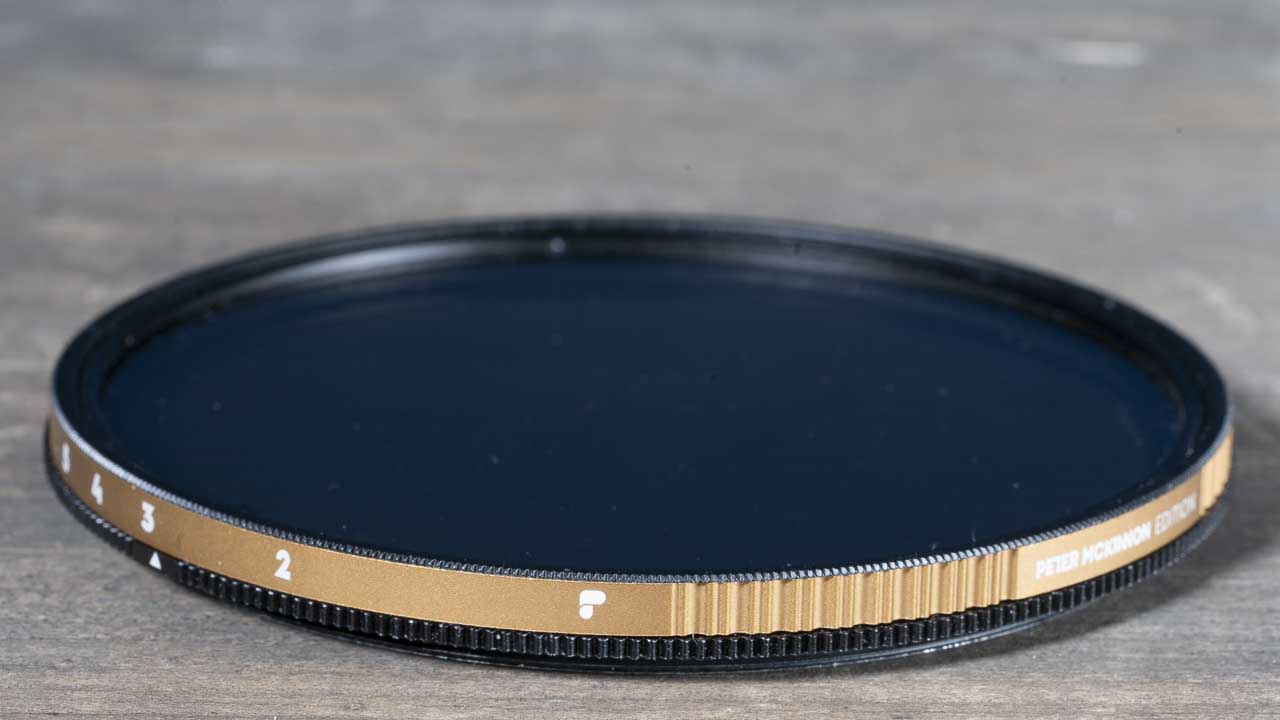
- Price: $249
- 2-5Ev
- Fused quartz glass
Etched markings on the aluminium frame of the PolarPro Variable ND 2-5Ev make it easy to make precise adjustments to exposure. The rotating action is smooth and silent, plus vignetting is well controlled. Detail levels are also maintained extremely well.
The filter is available in three sizes, 67mm, 77mm and 82mm at $249.99 each. That makes the 82mm the best value as it can be used with a greater range of lenses using a step-down ring.
An adjustment range of 2-5Ev is suitable for a wide range of scenarios, but if you need a stronger filter, check out the 67mm, 77mm and 82mm 6-9Ev versions which retail for $299.99 each.
Get the best deals on the PolarPro Variable ND filter at Amazon UK and Amazon US.
Moment Variable ND64 – 512
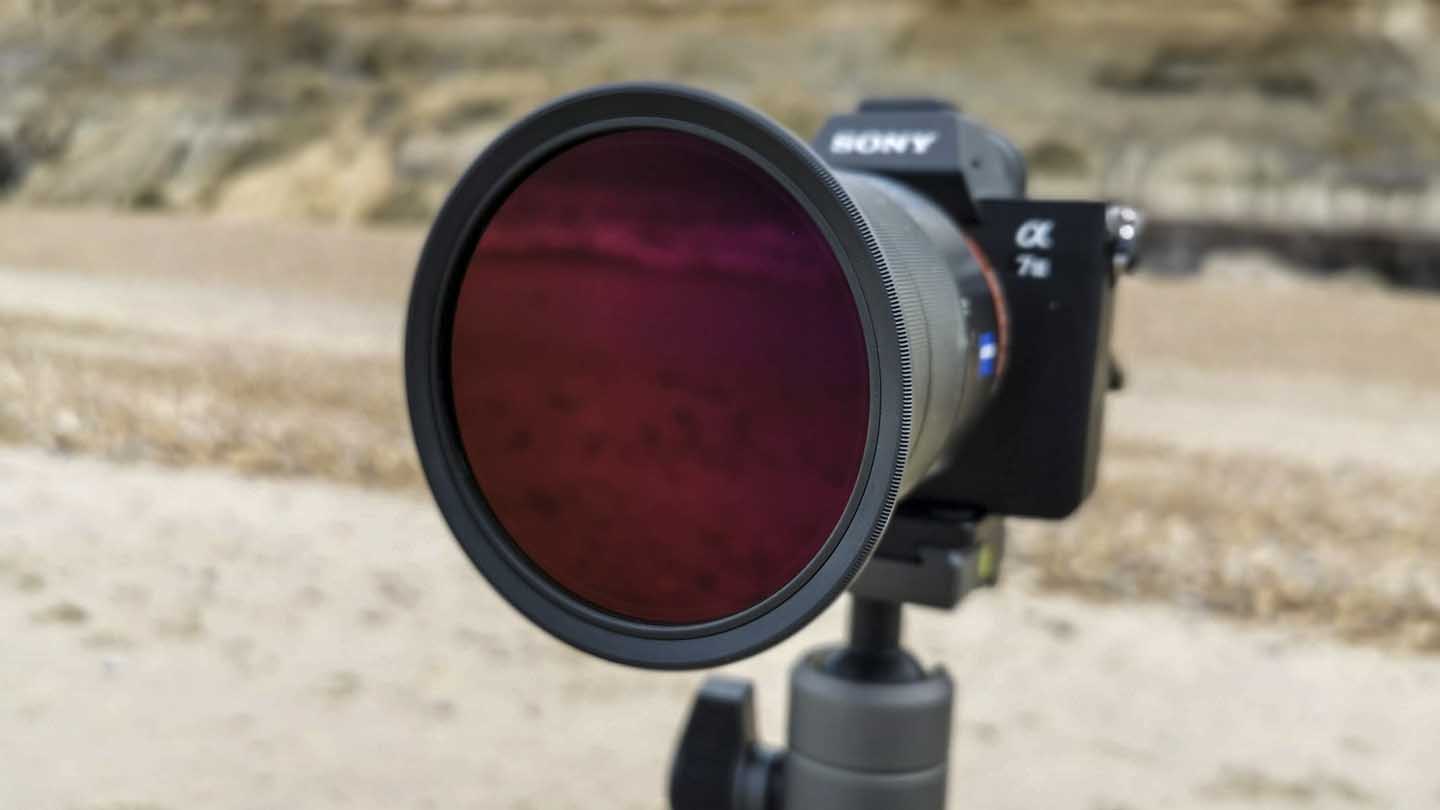
- Metal protective case
- High-quality manufacture
- Notch marking design
The Moment Variable ND is a lens mounted filter and screws directly into the front of your camera’s lens; it can then be rotated to increase or decrease the effect. From the first moment you open the case, you can feel that this is something different. The red hue of the coating of the front element highlights that difference.
But look over the frame, and you see the laser-etched markings, the anodising, knurling and small design features such as the notch that make it that easier to gauge the density. There are cheaper and more expensive variable ND filters out there, but this is a solid middle ground.
The optical quality is excellent, you do get a slight increase in contrast and a slight shift in hue, but nothing a quick tweak in Lightroom, Affinity or Photoshop won’t sort in a click or two.
Get the best deals on the Moment Variable ND64 – 512 at Amazon UK and Amazon US.
Haida Interchangeable NanoPro Magnetic Variable ND Filter
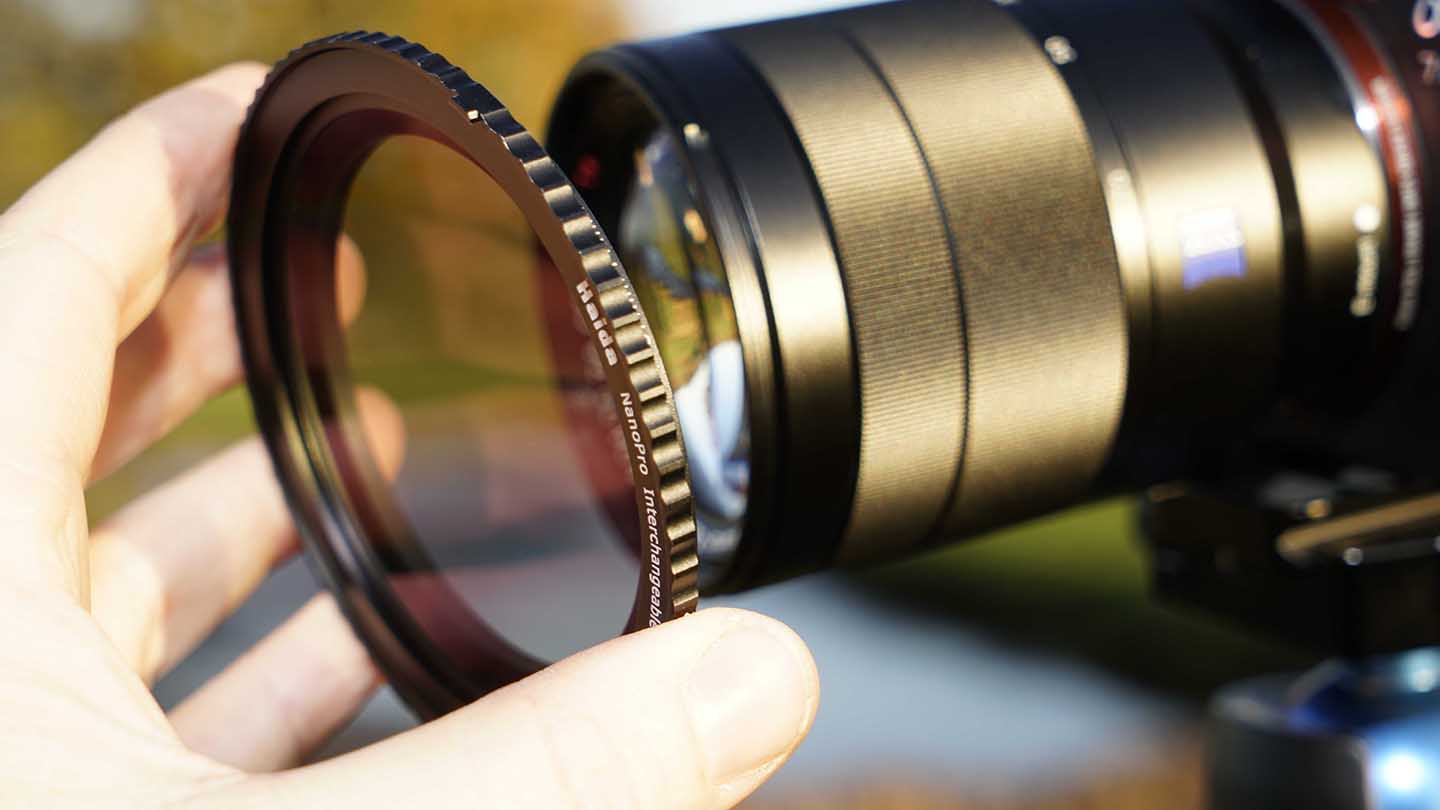
- Fast to fit
- Excellent optical quality
- Feature end stops
Like other variable NDs, this magnetic version is constructed with two circular polarisers, as the element is rotated the density is increased or decreased affecting the amount of light that falls through the lens and onto the sensor.
The holder features one polariser, and the front element the other polariser. At present, there are two front element filters available a 2-5 stop and 6-9 stop, which gives a good range of densities. The magnet is built into the frame of the filter, so a quick alignment and the two parts clip together.
This makes it ideal for all sorts of photography where you want to extend exposure, and is, of course, ideal for video. The nice feature is that if you need to increase the density beyond the 2-5 stop, you can quickly clip off and clip back on the next filter, no unscrewing involved.
The Haida Intercahngable Variable ND is of excellent quality, and with two density ranges, 2-5 and 6-9 Stop to choose from you have everything covered.
There are plenty of Variable ND options out there, but not all come close to the convenience of the Haida offerings. As variable NDs go there’s little to fault with the optical performance, but what’s apparent is just how good an idea magnetic variable NDs are.
Get the best deals on the Haida Interchangeable NanoPro Magnetic Variable ND filter at Amazon UK and Amazon US.
H&Y Revoring Variable ND+CPL
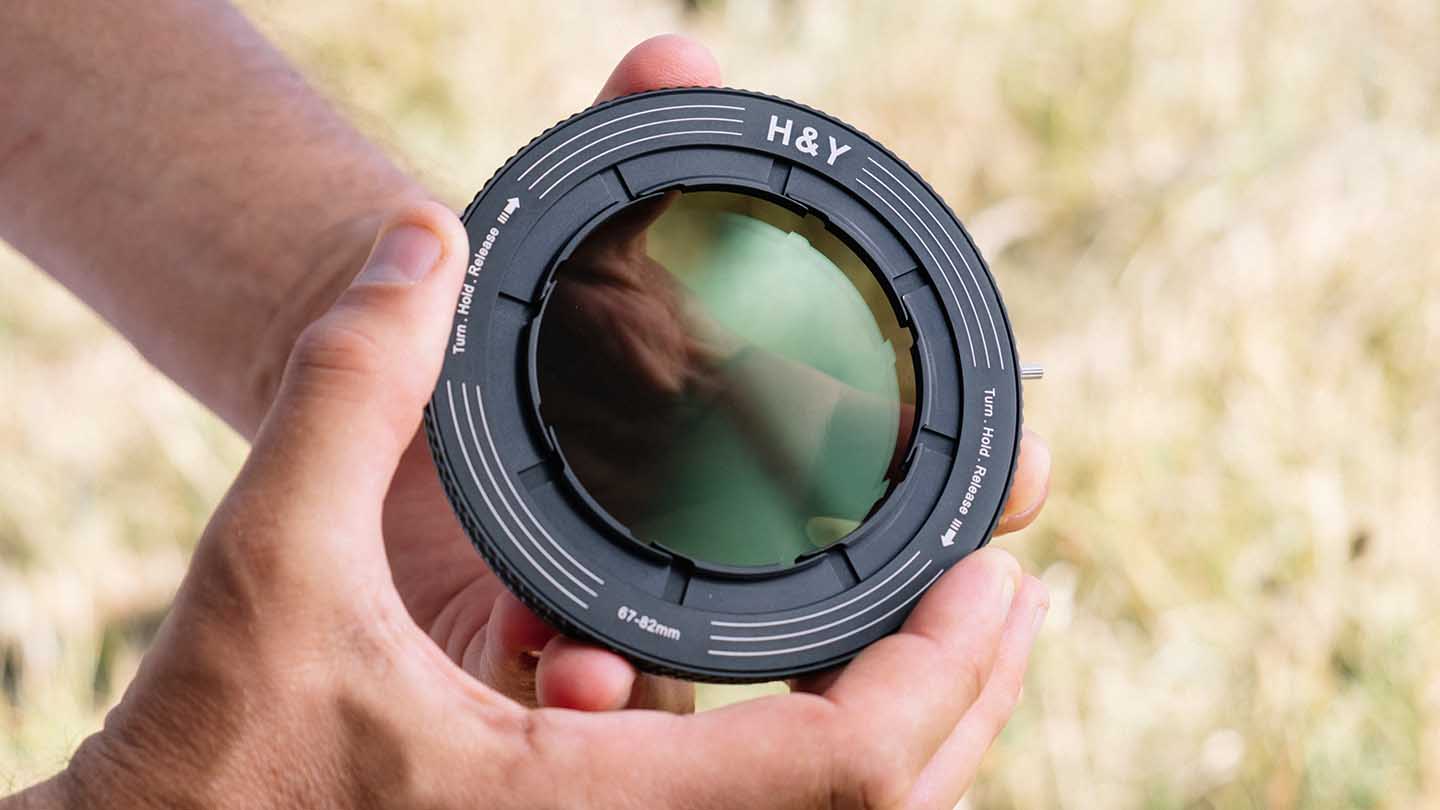
- Very quick and easy to use
- Nice build quality and attaches securely
- Replaces several step-up rings
The H&Y Revoring Variable ND+CPL is a variable neutral density filter and a polarising filter with a novel type of mount. It’s essentially the H&Y Revoring with a couple of filters built-in.
H&Y has just launched a Kickstarter campaign to fund both the Revoring and the Revoring Variable ND+CPL. Their anticipated delivery date is November 2020, but we’ve been able to test an early sample.
The smart thing about the Revoring Variable ND+CPL is that instead of screwing onto a lens filter thread, it grips it with a variable-sized mount. That means it can fit a range of lenses.
H&Y makes the Revoring Variable ND+CPL in three sizes:
- 37-49mm
- 46-62mm
- 67-82mm
The Revoring Variable ND+CPL looks to be useful to photographers looking to shoot long exposures or use wide apertures, and videographers who need to restrict their shutter speed.
Get the best deals on the H&Y Revoring Variable ND+CPL at Amazon UK and Amazon US.
URTH Variable ND2-400
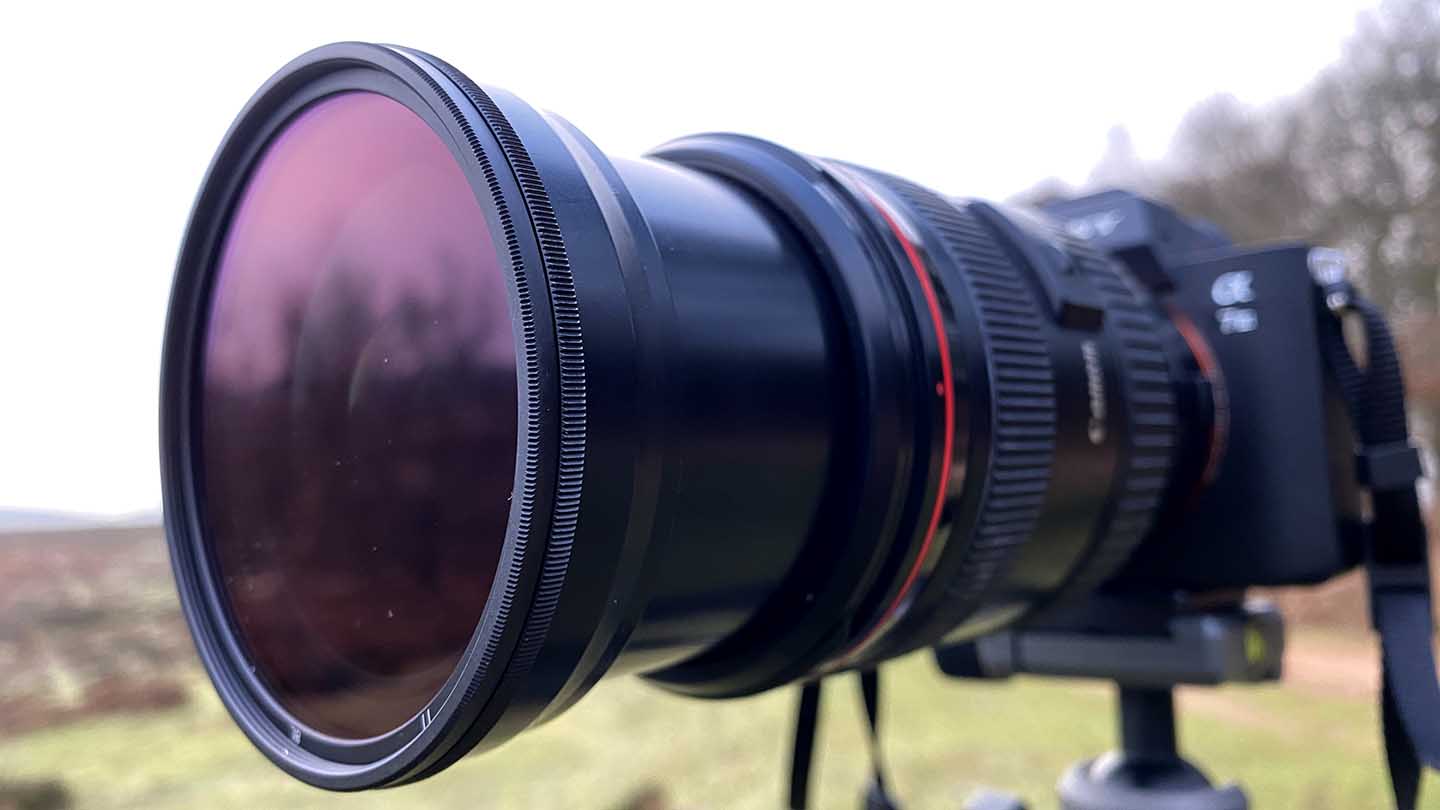
- Quality construction
- No vignetting
- Great colour rendition
The URTH Variable ND2-400 offers wonderful design and mechanical function, with full annotation, end stops and a textured bevel for easy adjustment. The glass’s quality is excellent, with little to no visible signs of vignetting through the full ND range.
Priced in the middle of the range, the URTH variable ND feels like a big step up from most budget filters, providing quality that matches some of the more expensive options on our list. Quality machining also gives the circular rotation of the front element a smooth, yet precise feel.
The URTH Variable ND2-400 is one of the best variable ND filters you can buy for your money. Find great deals on Amazon UK and Amazon US.
Haida NanoPro Variable ND Filter
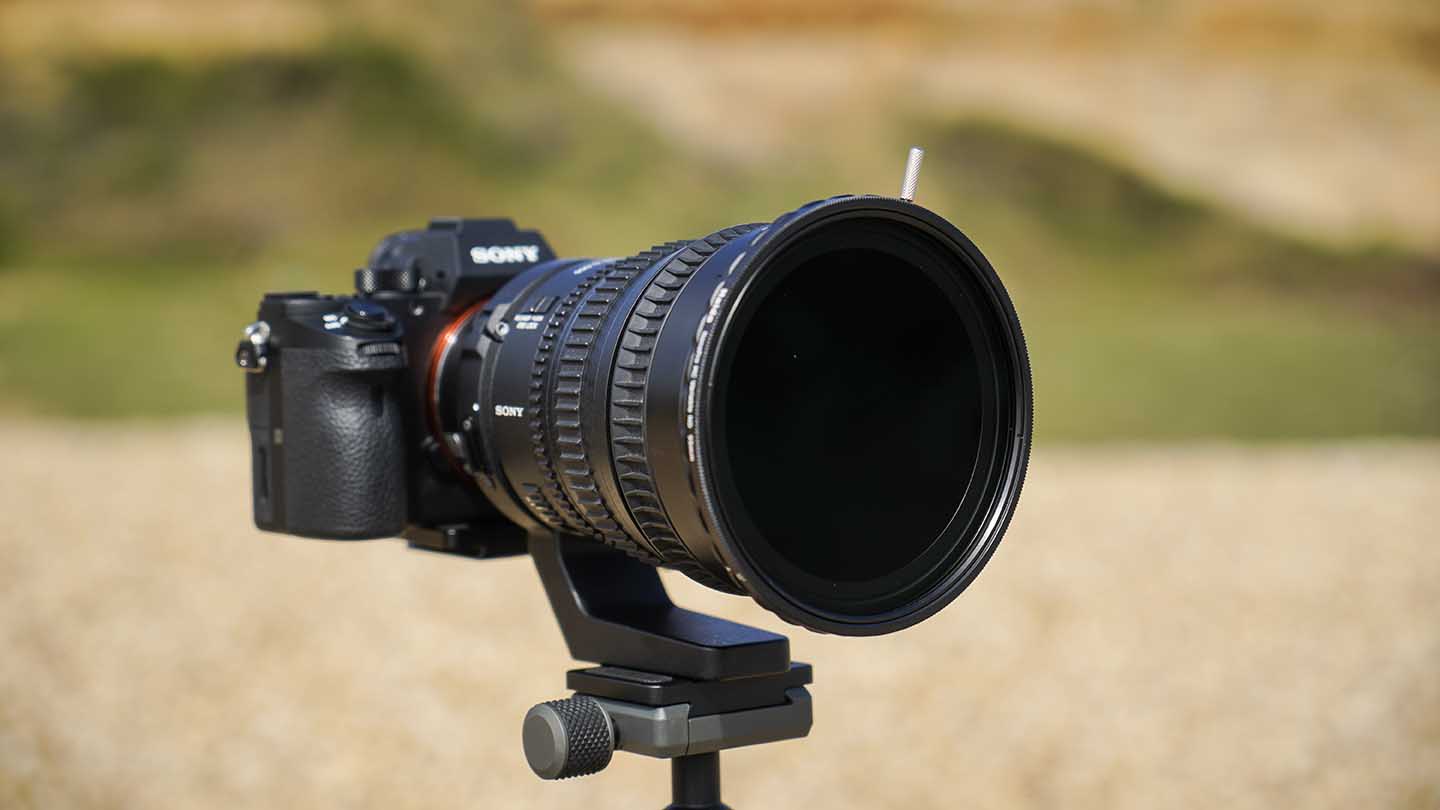
- Good quality glass
- Great design
- Exceptional value
High-quality glass with some subtle but clever design features make this large 95mm variable ND filter from Haida an ideal choice for filmmakers and photographers. As with all variable NDs, there is a slight colour cast, but this is easily corrected. The benefits of being able to adjust exposure without dipping into your camera settings is worth the small colour cast sacrifice.
Haida’s 95mm is an ideal choice for videographers while the smaller versions are well priced and offer superb value for photographers.
What you get for spending that extra on the Haida is a huge leap in optical quality over the entry-level models, and at the other end of the scale optically it does the job of filters twice the price. For the price, the Haida NanoPro Variable ND is outstanding value and manages to hit that careful balance of optical quality, price and build.
Find great deals on the Haida NanoPro Variable ND Filter at Amazon UK and Amazon US.
Square ND filters or Round ND filters: which is better?
There are generally two types of ND filters you can buy: circular filters that screw on to the front of your lens or a square filter that mounts via an adapter. Let’s take a look at the pros and cons of both.
Square filters are useful because you can use them on all of your lenses, regardless of size. They slide into an adapter that screws on to the end of your lens. This adapter can be fitted to any of your lenses. A circular filter screws into the end of your lens, so these are limited to use on a specific lens.
Square filters can also be stacked inside their adapter, which means you could put two 3-stop filters together to replicate the effect of a 6-stop ND filter. You can also stack a polariser with your ND grad. Again, this gives you a lot of flexibility.
What’s more, because square and rectangular ND filters are wider than the diameter of your lens, there’s often less vignetting. On the other hand, square filters are more fragile and take longer to set up.
Circular ND filters, while less versatile as their square counterparts, are pretty robust, quick and easy to set up and can also be stacked. However, they are limited to specific diameters, and they can be prone to vignetting.
The answer to whether you should buy a square or round ND filter really comes down to your workflow. If the extra time setting up doesn’t bother you, then a square filter is probably your best bet.
If you do go for a round ND filter, you should consider buying a large filter and some step-up rings so that you can use it on several lenses. This could be a nice compromise.
Glass vs resin ND filters
ND filters will either be made of glass or resin. Glass ND filters are higher quality. The provide a better optical quality and nicer colours; however, they are more expensive. They can also break quite easily.
Resin filters are much cheaper and more durable, but the trade-off is less clarity and sharpness. The dyes used in their production can also degrade over time. And while they don’t break all that often, the resin can scratch.
ND filter coatings
ND filters, like lenses, have coatings to help prevent reflections and improve light transmission. Many ND filter coatings also help reduce UV light so your colours are more natural.
High-end ND filters will also have coatings protecting them from scratches, and water and oil.
Best ND Filters you can buy today
As we mentioned at the top of this post, there are a few disadvantages to using variable ND filters. If you are after pin-sharp, big resolution images, shooting through the multiple layers of glass on a variable ND filter might not be right for you. You will probably want a fixed ND filter. To help you along in that search, below are our picks for the best ND filters you can buy today.
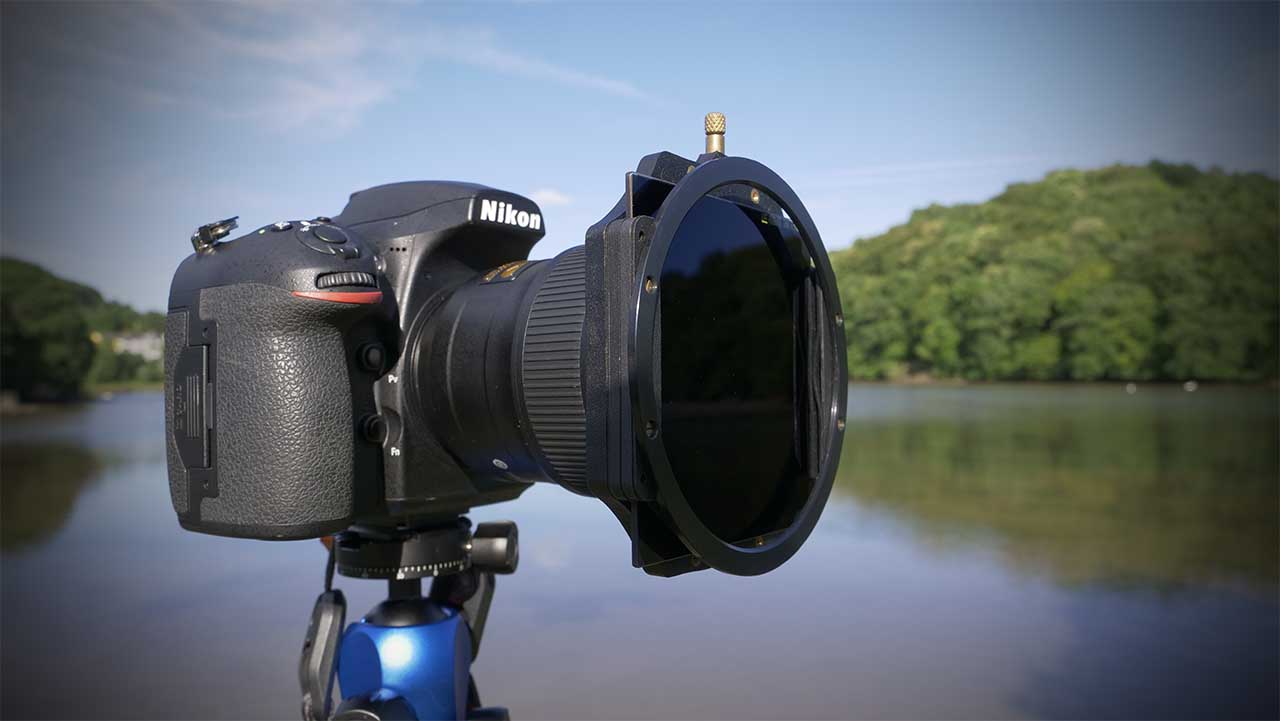
Lee Filters ProGlass IRND
- Prevents light leak
- Natural colours
Lee Filters ProGlass IRND are a range of neutral density filters (ND) with values ranging from 0.6ND through to 4.5ND available for the Seven5, 100mm and SW-150 filters systems.
The IRND coatings are designed to extend photographic exposure times and cut infrared and ultraviolet light leading to neutral colour casts and clear and crisp images.
And the coatings here are really something to highlight. People often ask, and the key difference between Lee’s Stopper range and the ProGlass IRND filters is that the ProGlass filters have a surface coating and there’s no dye mixed through the glass. This is a more expensive process but it means that the filter doesn’t cause vignetting with wide-angle lenses.
What’s more, the foam pad around the filter that helps to prevent light leak is a nice touch and used in bright daylight can be a godsend.
Note: Lee Filters ProGlass IRND filters have a protective coating but they should be treated with care to avoid damaging the neutral density layer.
Find the best deals on Lee Filters ProGlass IRND at Amazon UK and Amazon US.
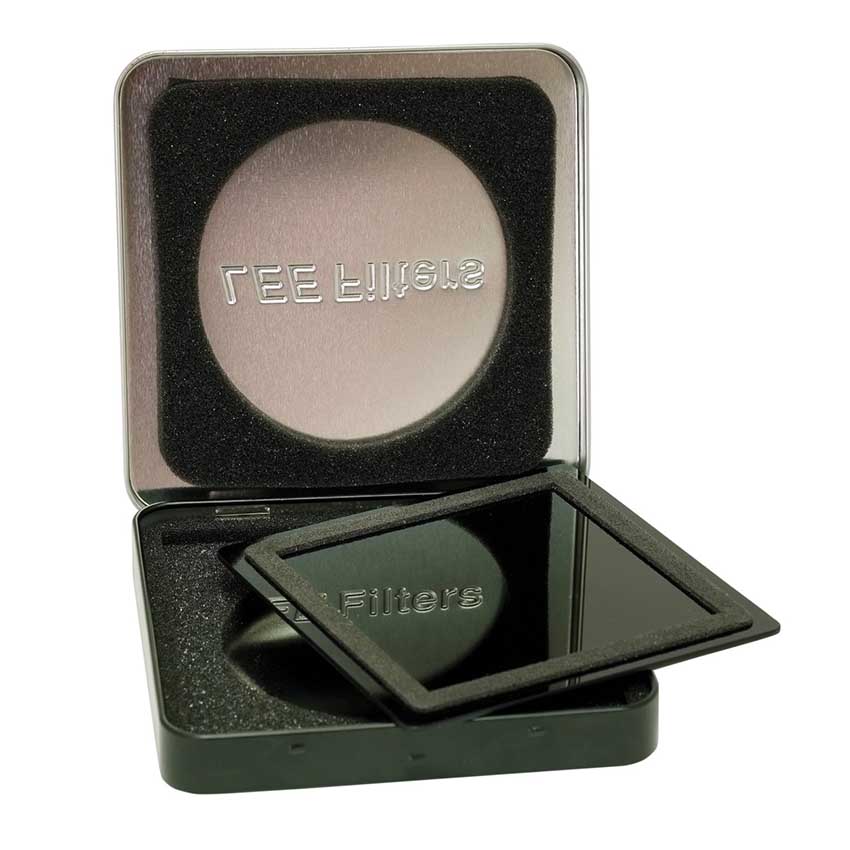
Lee Filters: Big Stoppers
- Widely used
- More affordable than the IRNDs
It’s called a Big Stopper because it’s very dense and it reduces the amount of light entering a lens by 10EV. Lee’s Big Stopper has become to filters what Hoover is to vacuum cleaners and many photographers refer to any dense neutral density filter as a Big Stopper, but it’s actually a product name.
The Big Stopper will blur anything that moves, whether rivers, people, traffic, you name it. It’s designed for big-time long exposures – the sort where you need a camping chair and a Thermos full of coffee because you’re going to be there a while.
Frankly, it’s the best at what it does. Lee Filters also makes the Little Stopper that cuts out 6EV of light and the Super Stopper that filters out a whopping 15EV of light.
Find the best deals on the Lee Filters Big Stoppers at Amazon UK and Amazon US.
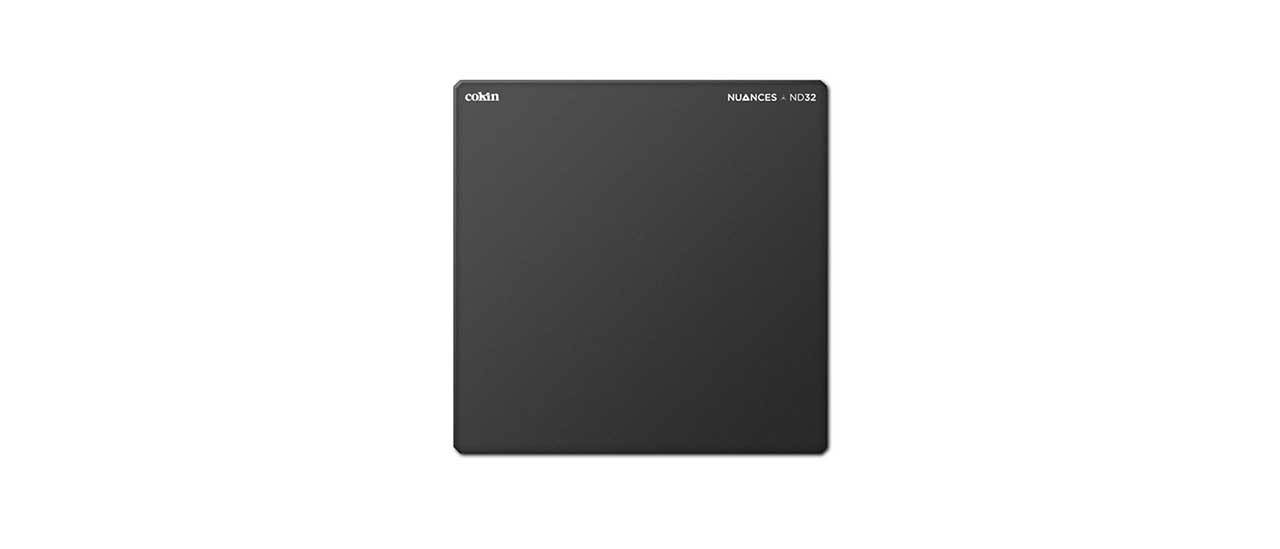
Cokin Nuances
- Nano metallic alloy coating
- Highly versatile
Cokin’s Nuances line uses a new nano metallic alloy coating on both sides, and the glass itself is tempered for high transmittance and low reflection.
Cokin’s Nuances ND range is available in M, L and XL sizes, and are designed to pick out the subtle details in the landscape and manage the… nuances in changing light.
Made from highly resistant tempered glass that can withstand drops, Cokin’s Nuances filters also offer a nano-metallic alloy coating for better colour consistency. You can also stack multiple filters without causing any strong colour cast.
The Nuances Extreme ND8 neutral density filter reduces light by three stops and sits alongside the existing Extreme ND64 and ND1024 filters. However, Cokin has also released an Extreme Full ND kit that comprises all three of these ND filters.
Find the best deals on Cokin’s Nuances filters at Amazon UK and Amazon US.
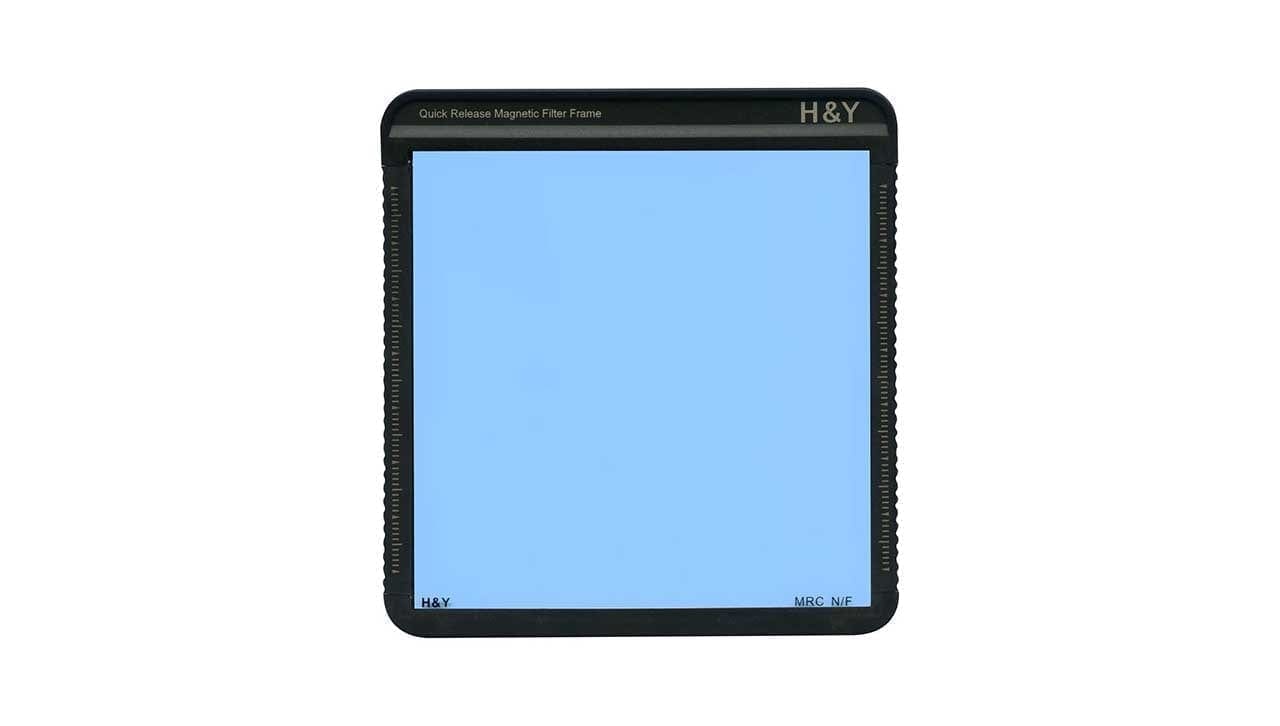
H&Y K-Series HD MRC Neutral Density
- Magnetic filter frame
- Promises no colour casts
H&Y’s K-Series HD MRC ND system uses a clever magnetic holder to mount your ND filter. What’s more, you can also use third-party filter holders by adapting them with H&Y filter strips.
As for the glass itself, H&Y uses a multi-coating that prevents unwanted colour casts.
The filters reduce the light by six stops, allowing you to shoot wide open in bright light or smooth over water with long exposures. The filter itself is made of Gorilla Glass III and is coated on both sides to prevent oil and water. The coatings don’t affect colour rendition.
Find the best deals on the H&Y K-Series HD MRC Neutral Density filters at Amazon UK and Amazon US.
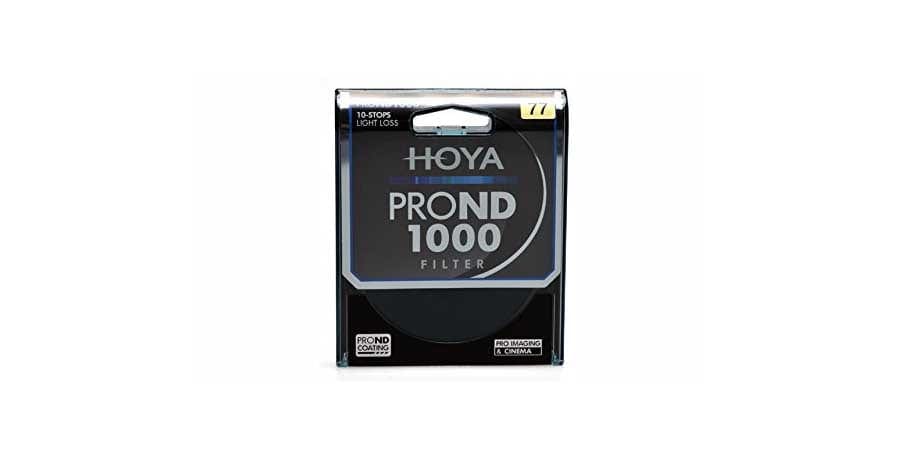
Hoya Pro ND filters
- Circular
- High quality construction
Hoya’s extensive ProND range features the PROND2, PROND4, PROND8, PROND16, PROND32, PROND64, PROND100, PROND200, PROND500, PROND1000 and PROND100000, which range from one stop all the way up to 16 3/5-stops of light reduction.
Hoya’s ProND filters are made of lightweight aluminium to prevent vignetting, and there’s also a metallic ACCU-ND coating to keep colours looking natural. Hoya’s ACCU-ND coating is designed to prevent colours from shifting as you move from one density to the next.
Hoya also offers a ProND filter kit, which includes an ND8 (3 stop), ND64 (6 stop) and ND1000 (10 stop) density filters along with a folding, padded case.
Find the best deals on Hoya Pro ND filters at Amazon UK and Amazon US.
Best ND filter holder
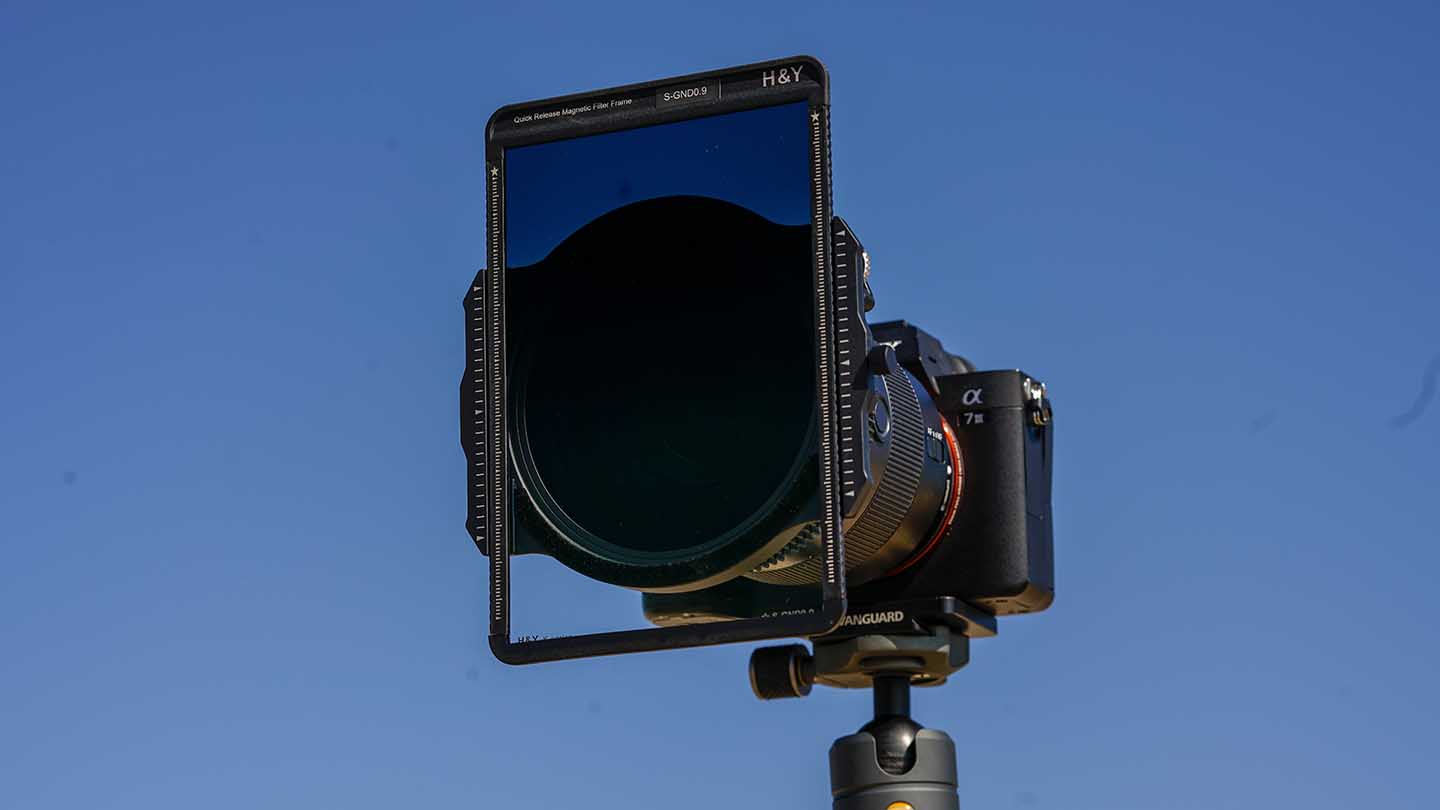
H&Y K-Series Universal fit magnetic filter holder
- Easy to use
- Possible to stack
- Compatible with other manufacturers filters
The H&Y K-Series 100x150mm and 100x100mm Universal fit magnetic filter holder is one of the most feature-packed filter systems we’ve seen. We were really impressed by the NiSi V6 filter holder, which is a beautifully designed piece of kit, but the K-Series is something more.
Recently there’s been an influx of filter systems, and surprisingly they’ve all been pretty good.
One of the best so far seen is the H&Y K-Series 100x150mm and 100x100mm Universal fit magnetic filter holder. Pop the holder onto your lens with one of the adapters, then pop the filter on the front. That’s it!
There’s no fumbling around with pushing filters into slots with cold hands. It’s all incredibly easy to use.
For that reason we can safely say that when it comes to ease of use, there’s no filter system close to the H&Y.
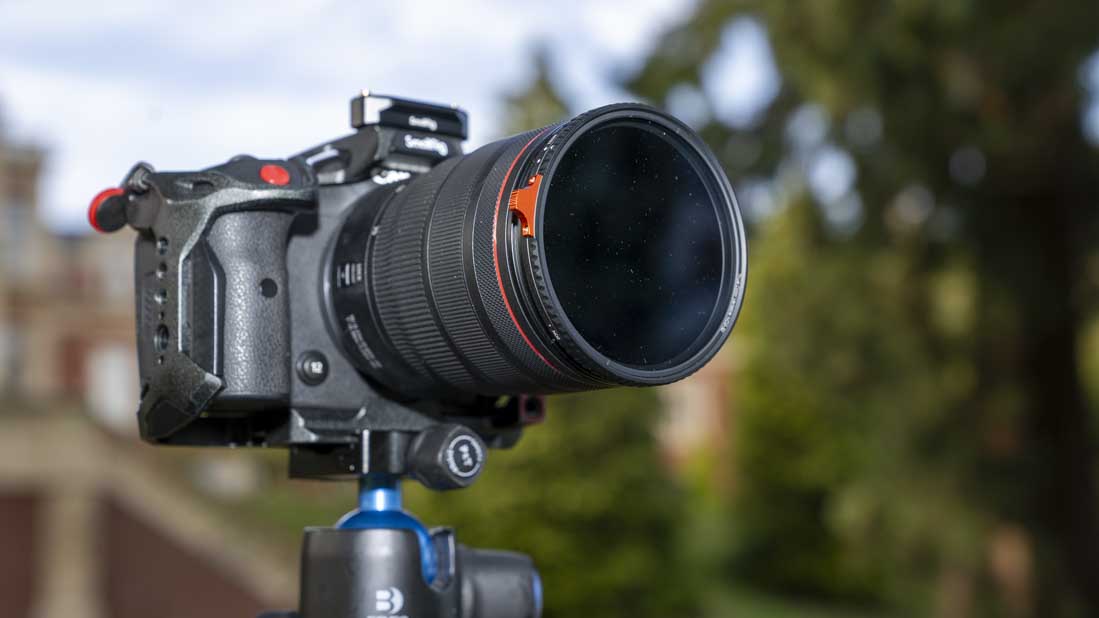
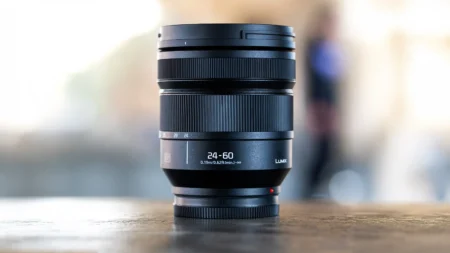

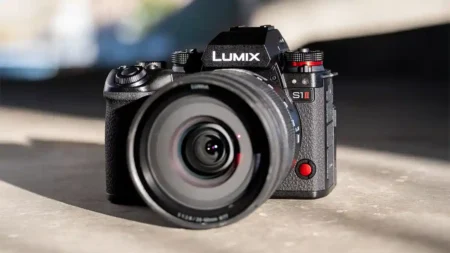
Of course vari ND impact the image quality, especially the colours.
Not always, some are more neutral than others.
Best review.
I am wondering why there is no mention of the very good K&F Concept filters? I have the variable ND2-400 and it has great neutral performance and no X cross! Check out all the youtubes to it. Theres one more thing: it costs half as much as the top performers in this test, yet its at least on par with them when filming…..